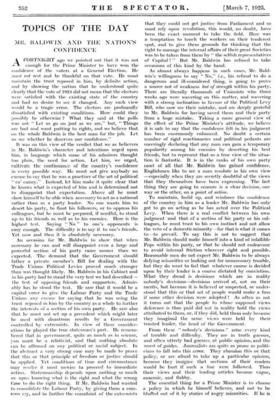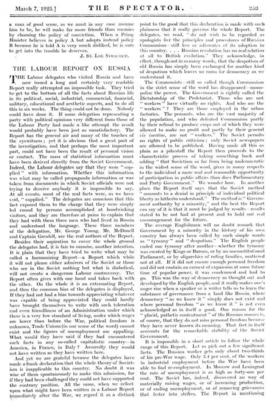TOPICS OF THE DAY
B. BALDWIN AND THE NATION'S CONFIDENCE
AFORTNIGHT ago we pointed out that it was not enough for the Prime Minister to have won the confidence of the voters at a General Election. He mast not rest and be thankful on that vote. He must maintain the trust reposed in him, by definite action, and by showing the nation that he understood quite clearly that the vote of 1924 did not mean that the electors were satisfied with the existing state of the country and had no desire to see it changed. Any such view would be a tragic error. The electors arc profoundly dissatisfied with existing conditions. How could they possibly be . otherwise ? What they said at the polls was not " Let us go on just as we are," but, " Things are bad and want putting to rights, and we believe that on the whole Baldwin is the best man for the job. Let us see whether he deserves our confidence."
It was on this view of the verdict that we as believers in Mr. Baldwin's character and intentions urged upon him, in language which some of his admirers thought too plain, the need for action. Let him, we urged, cultivate the continuance of the country's confidence in every possible way. He must not give anybody an excuse to say that he was a practiser of the art of political " ca' canny." Instead, let him make it quite clear that he knows what is expected of him and is determined not . to disappoint that expectation. Above all he must show himself to be able when necessary to act as a national rather than as a party leader. No one wants him to desert his party, to flout his followers, or to oppress his colleagues, but he must be prepared, if needful, to stand up to his friends as well as to his enemies. Here is the highest test. Saying " No " to one's opponents is easy enough. The difficulty is to say it to One's friends. Yet now and then it is absolutely necessary.
An occasion for Mr. Baldwin to show that when necessary he can and will disappoint even a large and powerful section of his party came sooner than we expected. The demand that the Government should father a private member's Bill for dealing with the Trade Unions Political Levies proved much stronger than was thought likely. Mr. Baldwin in his Cabinet and in his party had to stand the very test we had described— the test of opposing friends and supporters. Admir- ably has he stood the test. He saw that it would be a capital error to give the Labour Party and the Trade Unions any excuse for saying that he was using the trust reposed in him by the country as a whole to further the interests of a section of his own party. He saw also that he must not set up a precedent which might later be used with disastrous results by a Government controlled by extremists. In view of these consider- ations he played the true statesman's part. He remem- bered that in government, quite as much as in science, you must be a relativist, and that nothing abSolute can be affirmed on any political or social subject. In the abstract a very strong case may be made to prove that this or that principle of freedom or justice should he applied. Yet conditions of time and circumstance may render it most unwise to. proceed to immediate action. Statesmanship depends upon nothing so much as upon knowing what is the right and what the wrong time to do the right thing. If Mr. Baldwin had wanted to consolidate the Labour Party, by giving them a com- mon cry, and to further the complaint of theextremists that they could not get justice from Parliament and so must rely upon revolution, this Would, no doubt, have been the exact moment to take the field. Here was a temptation to touch the workers on their tenderest spot, and to give them grounds for thinking that the right to manage the internal affairs of their great Societies was to be taken from them by " the selfish representatives of Capital ! " But Mr. Baldwin has refused to take occasions of this kind by .the hand.
. As almost always happens in such cases, Mr. Bald- win's willingness to say " No;" i.e., his refusal to do a dangerous and ill-considered thing, is going to prove a source not of weakness but of strength within his party. There are literally thousands of Unionists who three weeks ago were wavering on this matter, and wavering with a strong inclination in favour of the Political Levy Bill, who now see their mistake, and are deeply grateful to Mr. Baldwin for having saved them and their party from a huge mistake. Taking a more general view of the effect of the Prime Minister's attitude, we believe it is safe to say that the confidence felt in his judgment has been enormously enhanced: No doubt a certain number of rigid reactionaries and political pedants are sneeringly declaring that any man can gain a temporary popularity among his enemies by deserting his best friends, but to represent that as a true view of the situa- tion is fantaStic. It is in the ranks of his own party most of all that Mr. Baldwin has gained confidence. Englishmen like to see. a man resolute in his own view —especially when they are .secretly doubtful of the views that they themselyes have been expressing. The last thing they are going to censure is a clear decision, one way or the other, on a point of action.
To maintain, build up, and reinforce the confidence of the country in him as a leader Mr. Baldwin has only got to go on acting as he has, acted over the Political_ Levy. When there is a real conflict between his own judgment -and that of a section of his party or his col- leagues, he must trust to his own instinct and not allow the veto of a domestic minority—for that is what-it-comes to—to prevail. To say this is not to suggest that Mr. Baldwin should make himself into a kind of infallible Pope within his party, or that he should not endeavour to avoid internal friction wherever right and possible. Reasonable men do not expect Mr. Baldwin to be always defying minorities or looking out for unnecessary trouble, but they do want to feel that whatever course is decided upon by .their leader is a course dictated by conviction. What they dread is decisions which are in reality nobody's decisions-decisions arrived at, not on their merits, but because it is believed or suspected, or under- stood that this or that set of people would make a fuss if some other decision were adopted I As often as not it turns out that the people to whose supposed views deference is to paid did not in reality hold the views attributed to them, or, if they did, held them only because they imagined the_ same views were held by their, trusted leader, the head of the Government.
. From these " nobody's decisions '•' arise every kind of trouble and difficulty. They are in truth guesses, and often utterly bad guesses,- at public opinion, and the worst of guides. JOurnalists are quite as prone as politi- cians to fall into this error. They abandon this or that policy, or are afraid to . take up a particular opinion, because they imagine - that sections of their readers would be hurt if such a -line were followed. Thus their views and their leading articles become vague, anaemic, and flabby.
The essential thing for a Prime Minister is to choose a policy in which he himself believes, and not to be bluffed out of it by stories of angry minorities. If he is a man of good sense, as we must in any case assume him to be, he Will make far more friends than enemies by choosing the policy of conviction. When a Primp Minister believes in policy A but adopts instead policy B because he is told A is very much disliked, he is sure to get into the trouble he deserves.
J. ST. LOE STRACILEY.



























































 Previous page
Previous page